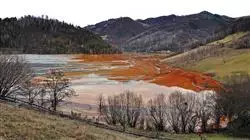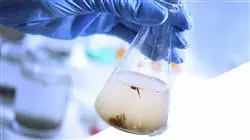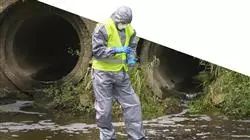University certificate
The world's largest faculty of engineering”
Introduction to the Program
A university program that will lead you to learn the techniques of assessment, analysis, control and treatment of environmental pollution”

The contamination existing in the world ranges from the toxic elements found in the water of a river to the very noise generated by the machines of a factory. A worrisome situation on many occasions, which also entails non-compliance with legal regulations, causing serious socioeconomic damage to society.
Whatever the factor causing it, it is necessary to have precise analyzes that allow professionals to make corrections or determine the possible effects on the health of people and the environment. For this, highly trained engineers with solid knowledge are required. It is for this reason that TECH has created this Postgraduate certificate in Contaminant Analysis that seeks to offer graduates the most relevant information and that contributes to the promotion of their professional career.
A program with advanced knowledge of analytical chemistry in the environmental field, the techniques used in sampling, the different elements that influence soil, water, and air contamination, as well as existing problems. All this will allow students to acquire learning with which they will be able to evaluate the impact of projects, plans or programs. In addition, thanks to multimedia resources, students will delve into the consequences of radiation contamination in a more dynamic and agile way.
Professionals is thus before an excellent opportunity to advance in their career, thanks to a Postgraduate certificate that they will be able to attend comfortably, whenever and wherever they wish. You only need an electronic device with an Internet connection, to be able to view at any time the content of the agenda hosted on the Virtual Campus.
This Postgraduate certificate will allow you to develop projects that reverse the environmental damage caused by pollutants in the waters”
This Postgraduate certificate in Contaminant Analysis contains the most complete and up-to-date program on the market. The most important features include:
- The development of case studies presented by experts of Environmental Engineering
- The graphic, schematic and practical contents of the book provide technical and practical information on those disciplines that are essential for professional practice
- Practical exercises where the self-assessment process can be carried out to improve learning
- Its special emphasis on innovative methodologies
- Theoretical lessons, questions for the expert, debate forums on controversial topics, and individual reflection assignments
- Content that is accessible from any fixed or portable device with an Internet connection
TECH puts at your disposal video summaries, videos in detail or case studies so that you can acquire the most advanced knowledge about water quality parameters”
The program’s teaching staff includes professionals from the sector who contribute their work experience to this educational program, as well as renowned specialists from leading societies and prestigious universities.
Its multimedia content, developed with the latest educational technology, will provide the professional with situated and contextual learning, i.e., a simulated environment that will provide an immersive education designed to learn in real situations.
The design of this program focuses on Problem-Based Learning, by means of which the professional must try to solve different professional practice situations that are presented throughout the academic course. For this purpose, the student will be assisted by an innovative interactive video system created by renowned experts.
Take another step in your professional career and enroll in a 100% online program, which will take you to know in detail the effects of pollutants in the atmosphere"

If you have a computer with an internet connection, you are ready to enter the Diploma in Contaminant Analysis"
Syllabus
TECH has designed a program to offer students the most advanced knowledge on Contaminant Analysis. Thus, in the course of this online program, the graduate will obtain the most exhaustive information on analytical chemistry, the instruments and techniques most used for the detection of residues, as well as the environmental problems of sound, radioactivity or organic and inorganic pollutants. in the atmosphere. All this, in addition to a Relearning system, which will allow students to reduce the long study hours so common to other teaching methods.

A program with a theoretical-practical focus on pollutants, their analysis and the different techniques used”
Module 1. Contaminant Analysis
1.1. Introduction to Analytical Chemistry in the Environmental Field
1.1.1. Introduction
1.1.2. Evolution Over Time
1.1.3. Environmental Analysis
1.1.4. Concepts and Analytical Process
1.2. Sampling
1.2.1. Sampling Plan and Collection
1.2.2. Types of Samples
1.2.3. Sample Transport and Storage
1.3. Sample Treatment
1.3.1. Introduction
1.3.2. Sample Preparation
1.3.2.1. Homogenization
1.3.2.2. Drying
1.3.2.3. Screening
1.3.2.4. Milling. 1.3.2.5. Filtering
1.3.2.6. Weighing
1.3.3. Processing of Solid and Liquid Samples for the Analysis of Inorganic Compounds
1.3.3.1. Dry Combustion
1.3.3.2. Acid Digestion
1.3.3.3. Fusion
1.3.4. Processing of Solid and Liquid Samples for the Analysis of Organizations Compounds
1.3.4.1. Extraction
1.3.4.2. Solid phase extraction
1.3.4.3. Solid Phase Microextraction
1.3.4.4. Purging and Trapping
1.3.5. Elemental Analysis
1.4. Instrumental Analysis
1.4.1. Molecular Spectroscopy
1.4.2. Atomic Spectroscopy
1.4.3. Gas Chromatography and Detectors
1.4.4. Liquid Chromatography and Detectors
1.5. Data Processing
1.5.1. Introduction
1.5.2. Basic Accuracy Concepts
1.5.2.1. Accuracy, Limits of Detection and Quantification
1.5.3. Types of Calibration
1.5.3.1. External
1.5.3.2. Internal
1.5.3.3. Standard Additions
1.5.4. Representation of Results
1.5.4.1. Confidence Intervals
1.5.4.2. Standard Deviation
1.5.5. Suspect Values
1.6. Water Characterization
1.6.1. Introduction
1.6.2. Quality Parameters
1.6.2.1. Organoleptic Properties
1.6.2.2. Dissolved Solids
1.6.2.3. Decantable Solids
1.6.2.4. Conductivity
1.6.2.5. Redox Potential
1.6.2.6. PH
1.6.2.7. Dissolved Oxygen Biological Oxygen Demand
1.6.2.8. Total Organic Carbon
1.6.3. Anions, Metals and Metalloids
1.7. Atmospheric Pollutants
1.7.1. Introduction
1.7.2. Primary and Secondary Pollutants
1.7.3. Inorganic Pollutants in the Atmosphere
1.7.4. Organic Pollutants in the Atmosphere
1.7.5. Suspended Particles
1.7.6. Effects and Analysis
1.8. Soil Pollution
1.8.1. Introduction
1.8.2. Phenomena and Chemical Composition of Soils
1.8.2.1. pH, Total Organic Carbon
1.8.2.2. Ion Exchange Capacity
1.8.2.3. Redox Potential
1.8.3. Organic and Inorganic Pollutants
1.9. Noise Pollution
1.9.1. Sound
1.9.2. Quantification of Sound and Its Effects
1.9.3. Environmental Problems of Sound
1.10. Environmental Radioactivity
1.10.1. Types of Radioactivity
1.10.2. Quantification of Radioactivity and Its Effects
1.10.3. Environmental Disasters Related to Radioactivity

Enroll now in a Postgraduate certificate that will allow you to delve into the quantification of sound, its effects and its environmental problems”
Postgraduate Certificate in Contaminant Analysis
The growing concern in society about the environmental impact has generated the need to train professionals in the analysis of pollutants. At TECH Global University we offer our Postgraduate Certificate in Contaminant Analysis program, focused on training students in the most current analytical techniques for the detection of contaminants in different environmental matrices. During the development of this course, students will deepen their knowledge of chemical, biological and physical contaminants present in the environment, as well as the application of specific analytical methods for their detection. Likewise, the evaluation of the results obtained and their interpretation for decision making in environmental management will be addressed.
The Postgraduate Certificate in Contaminant Analysis is presented as a fundamental tool for the training of highly qualified and specialized professionals in the field of environmental management. In this program, it is intended to foster the development of analytical and critical skills that allow the student to face and solve problems related to the detection of contaminants in different environmental matrices. It also seeks to provide the student with the necessary knowledge for the development and implementation of environmental management plans that allow the prevention, control and reduction of pollution in the environment.







